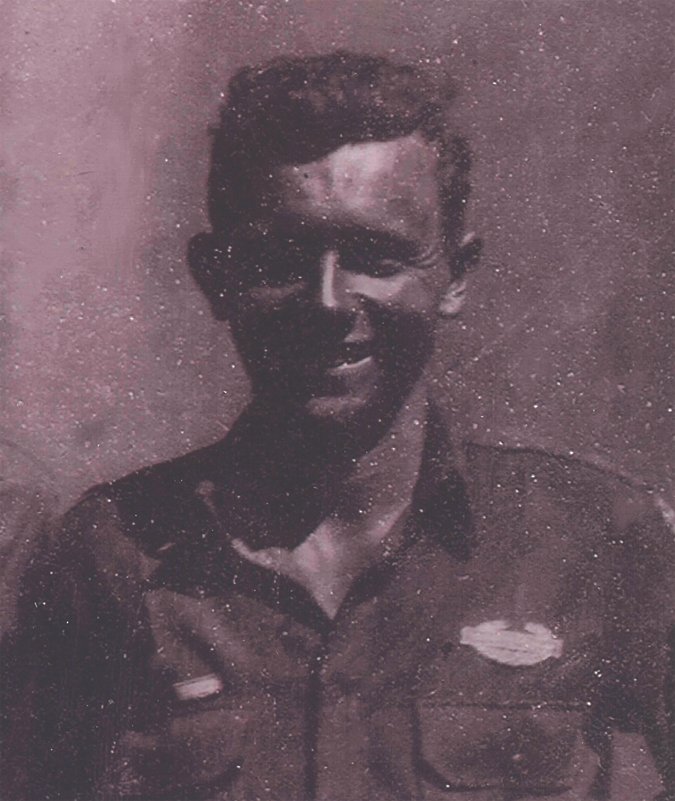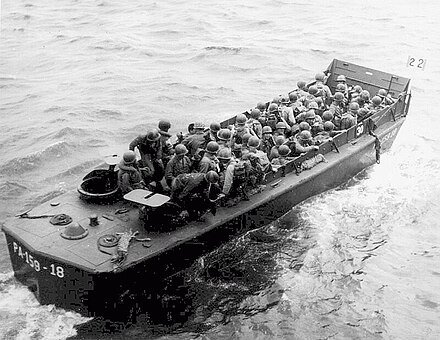Floyd S. Holt Jr.: In His Own Words
Floyd S. Holt, Jr. grew up in Woodstock and attended local schools before being drafted in 1943, about two weeks after he turned 18. He was sent to the European Theatre and arrived in France shortly after D-Day. A soldier of the 79th Infantry, he served in Northern France, Germany and central Europe, receiving multiple commendations including the Bronze Star. Floyd was interviewed for the Woodstock History Center’s Oral History Project on May 2, 2006, by Virginia Christy.
The following passage from his oral history begins by describing his experience when coming ashore at Utah Beach, which was used for landings during the D-Day invasion.
… You’d go over the side of one of those rope ladders down into … a small Higgins boat or whatever, and then they run you out to shore. There was one guy running this little boat… He’d stop and let the door down and you had to get out. Well, my God, I was chest deep in the water and some of those guys that weren’t as tall as I was, by golly, they were in up to their chin…
Above: An LCVP or "Higgins boat." Courtesy of US Navy, Public domain, via Wikimedia Commons
[The enemy wasn’t right there when we landed, but] they weren’t that far away, either… We could hear some [shooting] there to start with… Boy oh boy, I’ll tell you. It would pretty near lift you right off the ground fifteen miles away… Everything was shaking and you could feel the vibration of the ground…
There were wrecked gliders everywhere… In the initial invasion, a lot of those guys came in in gliders. The whole area was C-47, the old cargo planes, and a lot of them were pulling two gliders, and they’d get over there at a designated spot and they’d cut them loose, and they had to find a place to land. They didn’t have any choice… They’d put something like ten or fifteen men in a glider; they weren’t all that big, and some of them they’d squeeze a jeep in there or a small cannon… There was wreckage everywhere. And then you’d see cows running round and horses, beautiful horses. I couldn’t get over that…
Then we headed into Alsace Lorraine… A lot of it was German people… They were all farmers, for some reason. They were decent people… They were afraid they were going to lose their houses or their cows or pigs or something, which they did, a lot of them, through no fault of ours necessarily. Anti-aircraft, artillery.”
My division and the 30th Division, spearheaded the main drive for the 9th Army over the Rhine… Beyond that point right there [The Rhine River] was … the city of Essen. That was like our Pittsburgh or whatever. They had steel mills, Krupp had all his stuff there, manufacturing – they built cannons, guns and you name it… The Air Force had worked that over. Steelworkers were in there… [We were supposed to] get them to surrender or something… My company commander … and some others … they got to old man Krupp. He was alive and right there. And by God they went right to his door and beat on the door… Well, this doorman … said he wasn’t up or something and wasn’t available to see anybody right at the moment. [The commander] busted right through the door and said, “By God, we’re going to see him, right now!” He took off right up the stairs, and they got him [took him prisoner]… Well, he went through a court hearing. Of course he was instrumental in running the whole show there… He was a good friend [of Hitler’s]. I mean you couldn’t say well, he shot so-and-so because he didn’t actually pull the trigger, but he made the gun that did the job…
Gustav Krupp von Bohlen und Halbach (1931).
Image courtesy of: Bundesarchiv, Bild 102-12331 / CC-BY-SA 3.0, CC BY-SA 3.0 DE <https://creativecommons.org/licenses/by-sa/3.0/de/deed.en>, via Wikimedia Commons
Krupp factory making war materiel during WWI. Public domain.
[We took some German prisoners] but usually we’d just send them back, “go on back,” and they’d go, you know, and very little escort or anything… Well, things began to die down then [after Essen]. The worst was over there for us. They were still scrapping further south down in Austria and around that way, but we just kinda came to a halt and sat there, and by golly, the war ended. So we sat there a few more days, and they told us we were going to move. So we loaded up everything and away we went into Czechoslovakia… It was hilly country there, but it was beautiful. And it hadn’t been hurt. They hadn’t bombed that at all. There again, they were German people, but on the far edge of the town here are Russians…
In Czechoslovakia when we left there, again I say these people were pretty much all of German descent… They were nice people. I had no problems whatever. The morning we left there – you wouldn’t believe it – those people were all out on the sidewalks, and they were waving and crying and carrying on. They didn’t want us to leave….But the damn Russians were right over the fence there. When we got out, they came in. That’s what happened. And I’ve read since that the Russians took a lot of those people in that area and shipped them to God-knows-where, back in the salt mines or whatever. So they had reason to be upset that we were leaving.
[We sailed home from Le Havre] on December 20, 1945… That was a horrible trip… We ran into a storm. This was a Victory ship, one of the later ones, but anyway the weather predictions weren’t as good then as they are now… I don’t know if they saw this thing coming or not. But my God, we got just a little ways out of the English Channel, and we ran into this storm. Well they radioed back and said that they thought due to the severity of it they wanted to turn back and wait it out, and they said don’t even think about it because it’s churned up all of these mines that were in the channel and they were floating around any old place and you’re liable to run into a mine. So they kept going… It was like riding a cork, you know, just all over the place, and there was wind and rain and the thing would roll this way, then it would go this way, then it was going this way. Oh God, it was awful!... But we finally made it. Boy-oh-boy, what a relief!…
We docked [in New York City on New Year’s Eve 1946] right beside the old Enterprise. In those days it was the biggest carrier we had, and boy that thing looked humungous!... The superstructure on ours didn’t come up to the flight deck on the Enterprise. We unloaded from that ship that night; they put us on trains and took us to Fort Dix, New Jersey, which wasn’t too far… This old guy said, that was New Year’s Day, and he said, “Don’t worry about getting up in the morning. You can sleep as long as you want to. When you get ready, come to the mess hall; we’ve got New Year’s Day dinner waiting for you. And my God, I don’t think I ever ate any more than I did that day!... What a reception!




